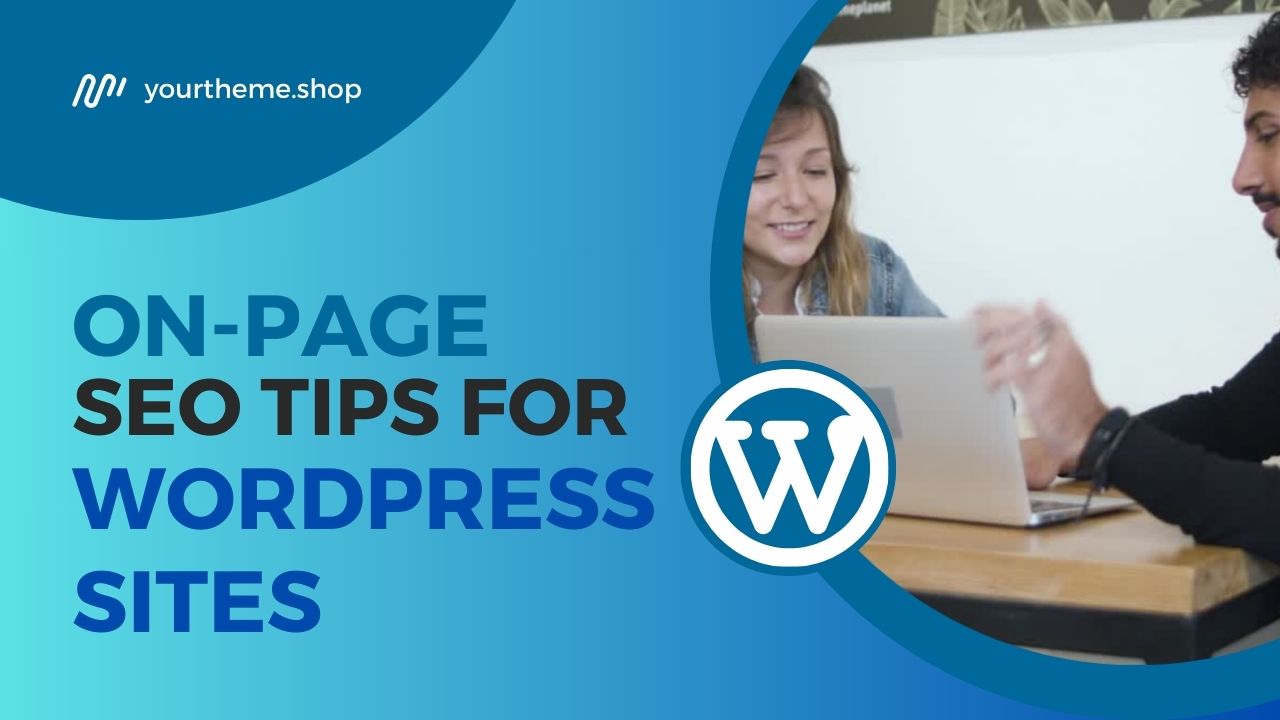On-Page SEO is a cornerstone of website success, especially for WordPress sites. In this detailed guide, we delve into various strategies, from optimizing WordPress meta tags for better SEO to leveraging effective WordPress plugins for on-page SEO improvement. This comprehensive article serves as an essential guide to keyword optimization in WordPress content, ensuring your website ranks higher and reaches its target audience more effectively.
On-Page SEO Tips for WordPress Sites
Understanding Meta Tags in WordPress
Meta tags in WordPress are fundamental elements in the realm of on-page SEO. They play a crucial role in conveying essential information about your site’s content to search engines. Understanding how to optimize WordPress meta tags for better SEO is key in maximizing your site’s search visibility and user engagement.
The Role of Title Tags and Meta Descriptions
Crafting Compelling Title Tags
Title tags are pivotal in on-page SEO and should be crafted with precision. They are the first touchpoint for users and search engines alike. A well-optimized title tag includes primary keywords and provides a clear, concise description of the page content. This is essential in using categories and tags effectively in WordPress for better SEO.
Meta Description Optimization
Meta descriptions offer a brief overview of your page’s content and should be written to entice readers while incorporating relevant keywords. In the guide to keyword optimization in WordPress content, it’s emphasized that meta descriptions should be both informative and keyword-rich, striking a balance between appealing to readers and search engines.
Enhancing SEO with Meta Tags
Importance in Search Engine Ranking
Meta tags, while not a direct ranking factor, influence click-through rates (CTR) significantly. Optimizing these tags is a critical aspect of on-page SEO tips for WordPress sites. They help search engines understand the relevance and context of your content, indirectly affecting your site’s ranking.
Best Practices for Meta Tags
Adhering to the best practices in meta tag optimization is a key part of effective WordPress plugins for on-page SEO improvement. This includes keeping title tags under 60 characters, ensuring meta descriptions are around 155 characters, and accurately reflecting the content of the page.
Utilizing Plugins for Meta Tag Optimization
Selecting the Right Tools
WordPress offers a plethora of plugins for on-page SEO improvement. Plugins like Yoast SEO and All in One SEO Pack are instrumental in simplifying the process of meta tag optimization. They provide intuitive interfaces for editing title tags and meta descriptions, ensuring that your meta tags are well-optimized for both users and search engines.
Plugin Features for Enhanced Meta Tag Management
These plugins often include features like SEO score analysis, readability checks, and automated suggestions for optimizing your meta tags. This makes them an invaluable asset in your strategy for on-page SEO tips for WordPress sites.
Step-by-Step Guide to Optimizing Title Tags and Descriptions
- Title Tag Optimization: Ensure your title tags are concise and include main keywords.
- Meta Description Mastery: Write compelling meta descriptions that accurately summarize your page content and incorporate relevant keywords.
Effective WordPress Plugins for On-Page SEO Improvement
The WordPress ecosystem offers a plethora of plugins designed to enhance on-page SEO. This section explores some of the most effective WordPress plugins for on-page SEO improvement, detailing their unique functionalities and how they contribute to boosting a site’s search engine performance. Incorporating these tools is a vital part of any strategy focused on on-page SEO tips for WordPress sites.
Comprehensive SEO Suites
All-in-One SEO Solutions
Plugins like Yoast SEO and All in One SEO (AIOSEO) provide comprehensive SEO toolkits. They cover a broad range of features, from helping you to optimize WordPress meta tags for better SEO to generating XML sitemaps and improving social media integration. These plugins serve as an all-encompassing solution for on-page SEO needs.
Real-Time Page Analysis
These plugins often include real-time content and SEO analysis, guiding you in optimizing every aspect of your content, including keyword density, meta descriptions, and readability. This aligns with the guide to keyword optimization in WordPress content, ensuring your posts are primed for both search engines and readers.
Focused SEO Plugins
SEO Frameworks
Some plugins, like The SEO Framework, focus on providing a lightweight, automated SEO solution. They are particularly effective for those seeking streamlined, efficient SEO management without the complexity of larger plugins.
Rich Snippets and Schema Markup
Plugins like Schema Pro automate the process of adding schema markup to your site, a critical component of modern SEO strategies. This markup enhances the way your pages appear in search results with rich snippets, which can include star ratings, author information, and more.
Image Optimization Plugins
Smush for Image Compression
Image optimization significantly impacts page load speed, a crucial factor in SEO. Plugins like Smush automatically compress and optimize your site’s images, reducing load times without sacrificing image quality.
Caching for Speed Optimization
W3 Total Cache and WP Rocket
Enhancing site speed is a significant aspect of on-page SEO. Plugins like W3 Total Cache and WP Rocket improve site performance by caching your pages, minimizing load times, and improving overall user experience, which is essential for SEO.
Analytics and Insights
MonsterInsights for Google Analytics Integration
Integrating Google Analytics with your WordPress site is made effortless with plugins like MonsterInsights. This plugin provides insights into user behavior, helping you tailor your SEO strategy based on actual performance data.
Additional Tools for On-Page SEO
Internal Linking Assistance
Plugins such as Link Whisper offer innovative ways to improve internal linking—a vital part of on-page SEO. They suggest relevant internal links to other content on your site, enhancing navigability and spreading link equity across your pages.
SEO-Friendly Security Features
Security plugins like Wordfence not only protect your site from malicious attacks but also ensure that your site maintains its SEO integrity by preventing spam and hacking attempts that can negatively affect your SEO rankings.
Reviewing Top WordPress SEO Plugins
Plugins like Yoast SEO and All in One SEO Pack offer comprehensive tools for on-page SEO, including features for optimizing meta tags, generating sitemaps, and more.
Keyword Optimization in WordPress Content
Integrating Keywords Effectively
In the realm of On-Page SEO Tips for WordPress Sites, effective keyword integration is a skill crucial for boosting your site’s search engine ranking. This detailed guide focuses on the art of keyword optimization in WordPress content, offering strategic methods to integrate both primary and secondary keywords seamlessly into your posts.
Fundamentals of Keyword Integration
Choosing the Right Keywords
The first step in this Guide to keyword optimization in WordPress content is selecting the right keywords. Utilize tools like Google Keyword Planner or SEMrush to find keywords that are relevant to your content and have a high search volume but low competition.
Understanding Keyword Relevance
When integrating keywords, ensure they align with the content’s topic and user intent. This is a vital aspect of How to optimize WordPress meta tags for better SEO since meta tags should accurately reflect the content of the page.
Strategic Placement of Keywords
In Title Tags and Headings
Incorporate your primary keyword into the title tag of your post. This practice is a cornerstone of On-Page SEO Tips for WordPress Sites. Similarly, use secondary keywords in H2 and H3 headings to structure your content effectively.
Throughout the Body Text
Sprinkle both primary and secondary keywords throughout the body of your content. The goal here is natural integration that maintains readability—key in How to use WordPress categories and tags for better SEO.
Balancing Keyword Density
Avoiding Keyword Stuffing
An essential rule in Effective WordPress plugins for on-page SEO improvement is to avoid keyword stuffing. Overusing keywords can lead to penalties from search engines. Aim for a natural flow of language that incorporates keywords organically.
Optimal Keyword Frequency
A balanced keyword density is critical. The rule of thumb in Guide to keyword optimization in WordPress content” is to maintain a keyword density of 1-2%. This ensures your content is optimized without compromising quality.
Utilizing Keywords in Meta Tags and Descriptions
Meta Title and Description Optimization
Keywords in meta titles and descriptions are pivotal for SEO. They should succinctly describe the content of the page while integrating primary keywords, as advised in How to optimize WordPress meta tags for better SEO.
Enhancing SEO with Long-Tail Keywords
Exploring Long-Tail Variations
Incorporate long-tail keywords into your content. These are more specific and less competitive, making them an effective strategy highlighted in On-Page SEO Tips for WordPress Sites.
The Role of SEO Plugins
Utilizing Plugins for Keyword Optimization
Leverage SEO plugins like Yoast SEO or All in One SEO Pack, which are crucial in “Effective WordPress plugins for on-page SEO improvement.” These tools provide insights into how well you’ve integrated your chosen keywords.
Balancing Keyword Density
Maintain an optimal keyword density to ensure content quality and search engine friendliness. Overuse of keywords can lead to penalties from search engines, while underuse might make your content less discoverable.
Creating SEO-Friendly URLs and Permalinks
A crucial aspect of on-page SEO is the structure of your URLs and permalinks. We delve into the best practices for creating SEO-friendly URLs in WordPress, discussing how to customize permalink settings for optimal SEO performance.
Structuring URLs for SEO
Choose concise and descriptive URLs that include your main keywords, avoiding overly long or complex structures.
Utilizing Categories and Tags for Improved SEO
Categories and tags are essential for organizing content in WordPress. Understanding the differences between categories and tags in WordPress and when to use each can significantly impact your site’s SEO and user navigation.
Effective Use of Categories and Tags
Use categories for broad grouping and tags for specific, topic-based content. Both should be utilized to enhance site structure and SEO.
Enhancing Content Readability for SEO
Content readability is crucial for keeping visitors engaged and reducing bounce rates, positively impacting SEO. This section covers tips for improving the readability of your WordPress posts, such as using short paragraphs and subheadings, and incorporating multimedia elements.
In the dynamic world of WordPress SEO, mastering on-page optimization is paramount. From crafting compelling title tags to meta descriptions and harnessing the power of SEO plugins, this comprehensive guide has unveiled the secrets to enhancing your website’s visibility. By incorporating these strategies for keyword optimization and meta tag finesse, your WordPress site is now poised to reach a wider audience and climb the search engine rankings. Stay ahead of the competition and optimize your on-page SEO for WordPress success!


